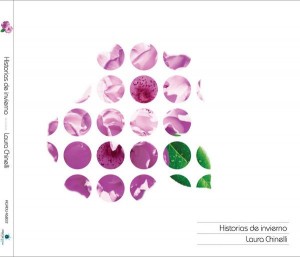
“Historias De Invierno” is Laura Chinelli's debut album. The band that recorded it included Fran Nasser, Nicolás Demczylo and Álvaro Barneche.
Is there life before love? Is there a time that exists outside of the prolongation of single moments that come to define us sentimentally? Or must we all live slave to that prolongation of moments, as if caught in an emotional ebb and flow which means all that happens will be validated by what had once come to be, ever and ever again?
Laura Chinelli’s debut album is nestled between all these questions, in a point where eyes are wide open, but often can only stare straight into that night which is not darkness but the blinding light of conscience. The majority of the songs on the album (which has been suitably named “Historias De Invierno” [Winter Tales]) have the singer retracing her steps through bridges that are not even there any longer, or burning with the kind of aching fire that is forever starting and stopping.

Laura Chinelli
In more places than one, “Historias De Invierno” feels like a musical variation on Villiers de L’Isle-Adams’ “Axel” – a story where the memory of love can modify all the present layers of perception. On songs like “Si Me Pierdo” [If I Get Lost], characters can’t see each other any longer. But their reflections still live in their eyes, and will keep on being there in spite of that blinding light which tries to overcome their staying force.
Other songs such as “Debajo De La Lluvia” [In The Rain] are more direct and rueful, very similar in tone and message to the defeatism of a song like Richard Thompson’s “She Sang Angels To Rest”. Compare Laura’s “puedo no volver a ser, puedo no ver, puedo no creer” [I might never be again, never see, never believe] and “Y si hoy soy lo que soy, y si no tengo a donde ir, y si hoy pierdo la razón” [And what if today I’m what I’m not, what if I have nowhere to go, what if I lose my mind] to Richard’s “how do you fall when you have already fell for the best”.
Yet, there are also moments of sentimental victory. The deepest comes as the album is ending with the song “Llévame“ [Carry Me]:
Llévame en tu mente
Búscame en los paisajes que te gustan
Búscame entre la gente
Búscame también en la oscuridad
[Carry me in your mind
Look for me in that scenery you love
Look for me in the crowd
And also, look for me in the darkness] Continue reading
